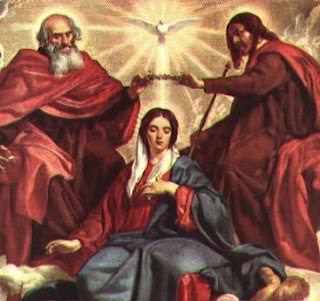The Spirit and the Bride: Mary’s Role at Pentecost
While the Holy Apostles were generally ignorant of the Holy Ghost, the Immaculate Mary knew Him intimately. Mary had already experienced the descent of the Holy Ghost at her Immaculate Conception since at that moment she was not merely preserved from all sin, but also filled with grace and the Holy Spirit. She was perfectly possessed by the Holy Ghost from the first moment of her existence. This is why Saint Francis of Assisi and other great saints have called Mary “Spouse of the Holy Spirit.” The analogy of matrimony is the strongest and best way to signify a union of two persons in their mission. Although not carnally married, the Holy Spirit and Mary are united perfectly in their mission. She never sins. She only desires the will of the Holy Spirit.
Moreover, the Holy Ghost overshadowed her in a powerful way at the virginal conception of Christ our Lord. Her whole life, then, was a communication with the Holy Ghost and she profoundly understood the mystery of the Holy Trinity – far better than the Council Fathers of Nicea, Constantinople, Ephesus, and Chalcedon. She is the greatest theologian.
In the nine days between the Ascension and Pentecost (this was the first novena), Mary was praying that the Apostles might come to know Him whom she already knew. While the Apostles prayed and waited without knowledge, Mary prayed with knowledge of the Paraclete.
On Pentecost morning, there were 120 people including the 12 Apostles. This was the new Israel. Mary was the burning bush – burning but never consumed – through whom the Holy Trinity was revealed to the people of God. Although she remained silent, as she did at the cross, she earnestly prayed that her Divine Spouse would visit these 120 faithful who were the first fruits of the Catholic Church.
This was the birthday of the Catholic Church, which is the mystical Body of Christ. As the Holy Ghost overshadowed the Blessed Virgin at the Annunciation and conceived Christ the Head in the womb of Mary, so now the Holy Ghost mystically conceives the Body of Christ. The Litany of Loretto refers to Our Lady as the “Mother of the Church” and this is precisely why. The Holy Spirit inspired Saint Luke to include these details for our benefit. There is a textual parallel between the the union of Mary and the Holy Ghost at the Incarnation of Christ and Mary and the Holy Ghost at the Birth of the Church on Pentecost.
Could God the Son have become incarnate without Mary? Yes.
Could God the Son have performed His first miracle at Cana without Mary? Yes.
Could God the Son have died on the cross for sins without Mary standing below in her desolation? Yes.
Could God the Son have sent the Holy Ghost on Pentecost without the present of Mary? Yes.
Yet God chose to accomplish these great redemptive mysteries with Mary. It was His free choice. He did not have to do things this way, but He did.
If God desires to include her, who are we to exclude her?
The Father thinks of her first when He considers creation. She is the most perfect creature. The Son loves her perfectly as His mother. The Holy Spirit chose her as His Spouse – to be united to His mission on earth. What a mystery! How then can we not love this tender mother? Her union with God unites her to the tender mercies of God. She cares for us and thinks for us at every moment.
Rejoice Queen of Heaven! O God, who gave joy to the world through the resurrection of Thy Son, our Lord Jesus Christ; grant, we beseech Thee, that through His Mother, the Virgin Mary, we may obtain the joys of everlasting life. Through the same Christ our Lord. Amen.
Do you enjoy reading Canterbury Tales by Taylor Marshall? Make it easier to receive daily posts. It’s free. Please click here to sign up by Feed or here to sign up by Email. Please also explore Taylor’s books about Catholicism at amazon.com.
What to Watch Next
Special Lent Course offer: https://nsti.com/checkout/?rid=pZxQpG Here’s the special link for the Lent Course and all bonuses for...
The scandalous details of the Epstein Files reveal the ancient strategy of double-layered religions: a dominant religion...
The Priestly Society of Saint Pius X (SSPX) announced on Feb 2 2026, that it plans to...
SHOP THE TAYLOR MARSHALL STORE
Dive Deeper

GET CONFIDENT IN YOUR FAITH
Explore the fascinating world of Catholic teachings with Dr. Marshall. Together you’ll unpack the brilliant answers the Church gives to tough questions about the Faith. The best part: you go at your own pace. Start this exciting journey today.


 >
>



